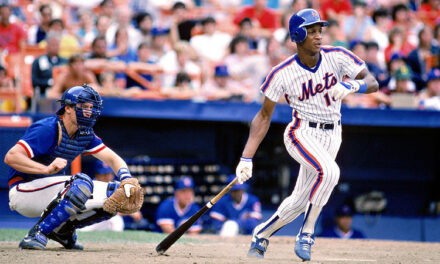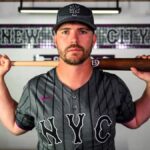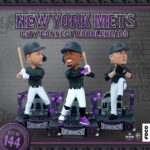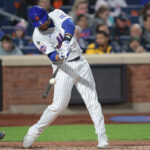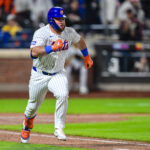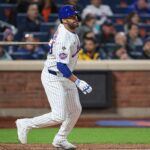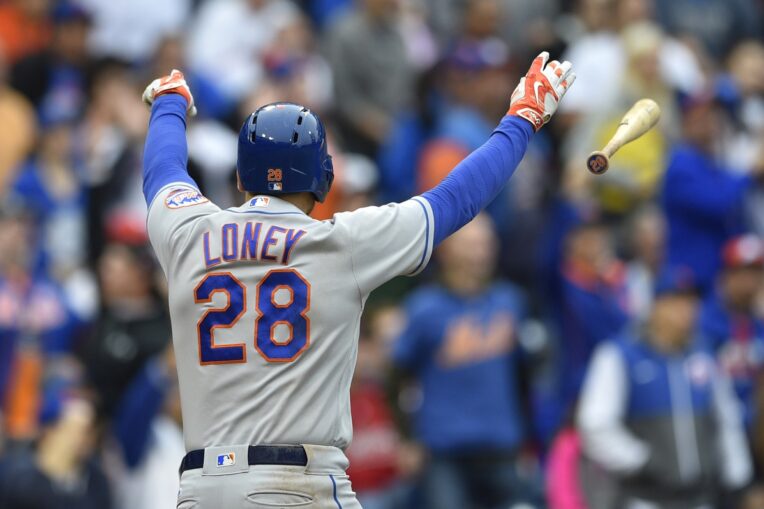
In May 2016, Mets’ slugging first baseman Lucas Duda was placed on the disabled list for a stress fracture in his lower back. With his return date in question, the club looked to quickly address their need at first base.
Less than a week from when the Mets placed Duda on the DL, they acquired veteran first baseman James Loney from the San Diego Padres for cash considerations.
Prior to being dealt, the left-handed-hitting Loney was playing for the Padres’ Triple-A affiliate in El Paso, slashing .342/.373/.424 in 44 games. Before signing a minor league with the Padres in 2016, Loney had spent his first ten seasons playing for the Los Angeles Dodgers, Boston Red Sox and Tampa Bay Rays.
With the Mets, Loney slashed .265/.307/.397 with 16 doubles, nine homers and 34 RBIs in 366 plate appearances. He also got to reunite with Terry Collins, who was the Dodgers’ field coordinator when Los Angeles selected Loney with the 19th overall pick in the 2002 MLB Draft.
Loney fared well early on with the Mets, recording a 123 wRC+ over 111 plate appearances in June, followed by a 111 wRC+ over 91 plate appearances in July. The month of August is where Loney hit a rough patch, posting a paltry 17 wRC+ with just one extra-base hit while rarely getting on base (.222 OBP, 1.1 BB%).
The veteran reversed his subpar August numbers to finish the season strong; posting a 119 wRC+, recording a 35.5 line drive rate (best of any month in 2o16) and .212 ISO (also his best mark of any month that season).
Unbeknownst to Loney, the National League Wild Card Game featuring the Mets and San Fransisco Giants would be the final major league game of his career. In 2017, Loney hooked on with three different organizations on minor league deals (Rangers, Tigers, Braves), but was either released or granted his release and was without a team by the end of May.
In July of that year, the LG Twins of the Korea Baseball Organization (KBO) signed the veteran for $350,000. His tenure was short-lived as Loney left South Korea after playing in just 23 games with the Twins. The club wanted to send Loney to their minor league affiliate after he was having trouble adjusting to the new league, but instead, Loney returned to the States.
After sitting out the 2018 season, Loney attempted a comeback by signing with the indy ball Sugar Land Skeeters in February 2019 as a two-way player (Loney pitched in high school and most teams were scouting him as a pitcher) and coach. He appeared in 11 games for the Skeeters, posting a .278/.357/.333 slash while also pitching an inning in relief for the club before announcing his retirement from baseball in early May.
This past offseason, Loney accepted a job with the Arizona Diamondbacks in their baseball operations department, where he’ll have the opportunity to work in a variety of roles including scouting, player development and as a mentor.
Overall, Loney appeared in over 1,400 major league games over an eleven-year stretch (2006-2016), posting a career slash of .284/.336/.410 and a 103 wRC+. His ability to stay healthy was evident as he appeared in the fifth-most games from 2008-2014 (1,095), playing in at least 155 games six out of those seven seasons. In his rookie season in 2007, Loney finished sixth in Rookie of the Year voting while posting the second-highest wRC+ (137) among qualified rookies.
I had the privilege of speaking with Loney over the winter where we discussed his early roots as a pitcher, thoughts on Terry Collins and his time in New York.
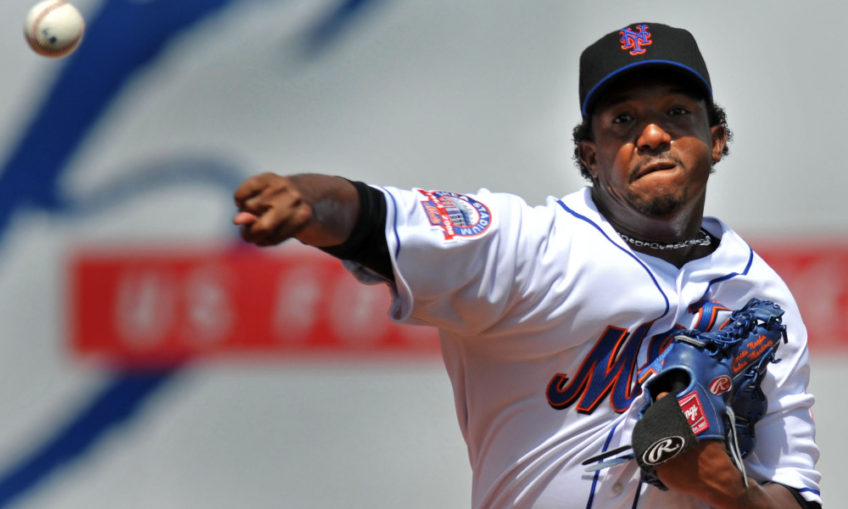
MMO: Who were some of your favorite players growing up?
Loney: I would say Ken Griffey Jr., Randy Johnson and Pedro Martinez. I got to play against all of those guys at one point which was pretty cool.
MMO: I read that your high school coach was Matt Carpenter’s father Rick. In past interviews, you’ve named Rick as an influential coach. Can you talk a bit about what made him so memorable for you?
Loney: I just felt like he had a great balance with everything. He always told us not to get too high or too low and that things are going to fluctuate in this game.
He had such a competitive spirit; if we lost to a team he felt we had no business losing to we were going to pay for it in practice by either running or doing something we really didn’t like. He still had that fight in him even though when you meet him for the first 30 seconds you’d think he’s probably one of the nicest guys in the world.
MMO: I read that prior to the 2002 MLB Draft 26 of the 30 clubs were looking at you as a pitcher, and the Dodgers were one of just a handful of teams that had an interest in you as a position player. Did you think heading into the Draft that you were going to be taken as a pitcher?
Loney: I think it was 28 teams because the only two teams that I remember looking at me as a hitter were the Pirates and the Dodgers.
I thought I was going to be a pitcher and I always liked doing both. In high school it was never like I wanted to do one more than the other, I just wanted to play.
I was throwing 92-94 mph in high school as a lefty, so I thought I was definitely going to get drafted as a pitcher. The Dodgers said they wanted to take me as a hitter and if it didn’t work out then we can try to go back to pitching later on. And I told them okay, let’s do it!
MMO: I can’t believe that you never made an appearance on the mound during your eleven years in the majors!
Loney: When I was with the Dodgers I was kind of the young guy and they didn’t want to blow out your arm. And then when I went to Tampa and had a really good year and I got a three-year contract thereafter, it was like we can’t blow that guy’s arm out either. [Laughs.]
When I went to the Mets I was a pretty key piece there because with Duda going down I just don’t think it was ever good timing. Maybe if I played a little bit longer I think I would’ve gotten that chance for sure. I might’ve gotten that chance with today’s game because I think you are seeing guys get those chances a lot younger now.
MMO: What are your memories from the 2002 Draft? Did you have any notion of where you’d be selected?
Loney: I didn’t know until the day before. The Dodgers called me the day before and said, “Hey, we’re going to take you with this pick, and this is how much it’s going to be.”
And I was like, ‘Yeah, I like it. Let’s go!’
I was ready to start. I think I started a week after my high school season ended. But before that, I was thinking I’d go in the top five rounds and I was thinking I was going to go as a pitcher.
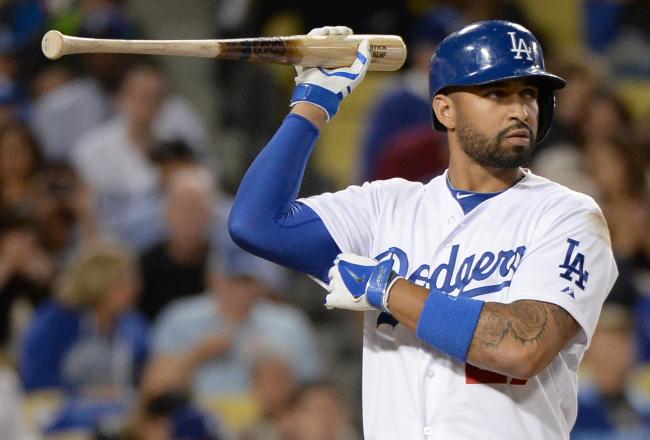
MMO: You came up with a group of young, talented Dodgers in Matt Kemp, Russell Martin and Andre Ethier. Can you talk a bit about that camaraderie and if it helped your transition to the majors?
Loney: I don’t think it can hurt. We had a great group and core of guys that were hungry to make it to the big leagues. Guys that fed off each other, I think we all made each other better. It was a lot of different personalities.
I think we helped the younger guys that came up too, whether it was through communication or just the way we played. I think it helped set the tone for those years in L.A.
MMO: Your career postseason numbers are extremely impressive: a .350 AVG, 16 RBI, .954 OPS. Obviously, the postseason is a completely different animal and you’re facing some of the best pitchers in the game in a short series. How did you keep so calm and be able to have such great success in the postseason?
Loney: I think for me, I always believed that I belonged there. When the playoffs came around it was like, who doesn’t want that? It was a fun time and we all wanted to get to the World Series.
I always believed in my abilities in those situations, I never felt the pressure or that the crowd was on me. I liked playing on the road.
MMO: One of your most memorable moments in a Dodgers uniform was your grand slam in Game One of the 2008 NLDS vs. the Cubs on the road. Can you talk a bit about that at-bat against Ryan Dempster in the fifth?
Loney: We had bases loaded and Dempster threw me a split-finger in the dirt and I swung at. He threw another split-finger in the dirt and I swung at it. Then he threw me a high fastball just out of the zone that I didn’t swing at. Then I was like, I know he’s going to throw another split-finger here, I just knew it after he already threw me two that I swung at. Sure enough, he threw another one but he didn’t bounce this one [Laughs.] He left it right there for me to hit so that’s how that at-bat went down.
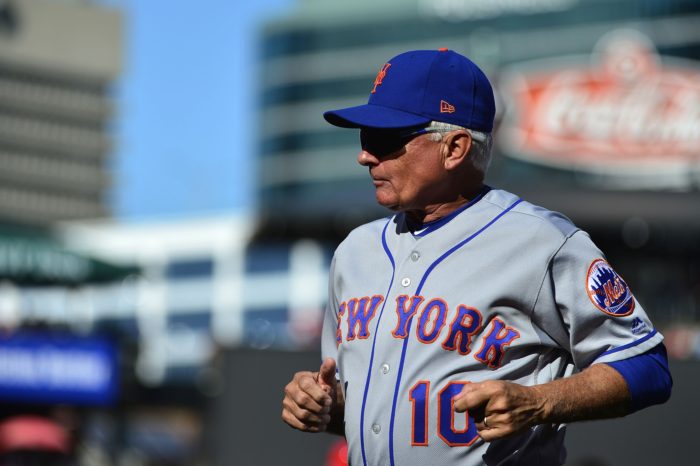
MMO: Terry Collins was the Dodgers field coordinator and director of player development while you were in the early portion of your professional career. You then had him as your manager in 2016 with the Mets. I’m curious what your thoughts of Collins are from your tenure with the Dodgers and one season with the Mets?
Loney: I thought he was awesome. My first year in pro ball and I’m eighteen years old, I don’t know what to expect and you’ve got this guy running around who’s all fiery and yelling. But you could tell that he had passion and he cared for the players and he cared about the organization.
I remember him taking us to his house that he had in Florida, some of the younger guys, and just was talking to us and telling us how it was going to be. That was really special and one of the things I remember with the Dodgers.
Then going to the Mets was pretty cool with like what you said, being my last year in the big leagues with him and making it to the one-game playoff. But he’s always been a great guy.
MMO: You spent what would be your final major league season with the Mets in 2016. What are your memories from playing with the Mets that year, and what were your impressions of playing in New York?
Loney: I thought it was great! Great guys on the team and made some great relationships there. And just the atmosphere there with the fans bringing it every single night. You felt like you had a little bit of a home-field advantage. It felt like Dodger Stadium a bit, just with the passion the fans brought. They feel like they’re on the field with you, they felt like they just hit that home run or just struck out a big batter. I loved it.
MMO: You signed with the LG Twins of the Korea Baseball Organization in 2017, and played in 23 games. How was your experience there and what were some of the major differences between the Korea Baseball Organization (KBO) and Major League Baseball?
Loney: Where I was in Seoul was kind of like New York, I think it’s around 9-10 million people. It’s like a big party there versus the U.S. during a game. They’re banging on drums, blowing whistles, boomboxes in the stands. So it’s a pretty good atmosphere there.
You stand out a little bit as an American so when you leave the game people know you. But they’re so into baseball, I think overall they might be more into baseball just because I think a lot of the history some of their guys had in the major leagues and the following that they created. And it’s their number one sport for sure.
MMO: We often match up offensive profiles with a player’s position and first base is normally a position that features power. You were a bit different in approach, as you were a guy that made a ton of contact & had low strikeout rates. Can you talk a little about your approach at the plate during your career?
Loney: I look back at it now and there were probably some times I should’ve tried to pull the ball more and hit for more power. I think from an early age and early in my career I had pretty good averages, so I think I was just kind of content staying in that range versus if I tried to go for power and if it doesn’t happen AND my average goes down then it’ll be like what happened to this guy.
I was getting away with hitting .280-.290 for a while and driving in runs, but when I look back on it I would definitely have taken a few more chances, especially in situations where I knew or had a good feeling that a certain pitch was coming.
MMO: Throughout your career, how much did you incorporate analytics into your game plan?
Loney: I’d be into it for a little bit and then I’d be out for a little bit. I think looking back I should’ve been into it more as far as getting the information and then using it and processing how I would use it in a situation. I would watch videos of some guys from my at-bats or maybe their last start so I was pretty prepared.
Looking back at it, I think I could’ve prepared just a little more especially for situations where I was looking to hit for more power or certain situations where the game is on the line.
MMO: When you look back over your career, what are you most proud of?
Loney: I would say my health. I wasn’t hurt that much and I think that’s missed a lot in today’s game. Getting on the field, that counts, and I take a lot of pride in that. And even when I did get hurt – I slid into a base and I was out for like six weeks – but that was sliding it wasn’t from pulling a hamstring.
MMO: It was reported this offseason that you accepted a role with the Arizona Diamondbacks in their baseball operations/player development departments. First off, congratulations! Secondly, was this something you were looking to get into for some time? And what types of roles are you going to take on with Arizona?
Loney: I’ve been thinking about it, I was really wanting to get back and help the game any way that I can. I think this is the best way to do it because I’m not necessarily just for player development; baseball operations is a really broad field where you can do some scouting, player development and mental skills.
There are so many different areas so I get to navigate my way around those different areas this year to kind of see what I like and see what I can help out without being tied down to one spot.
MMO: Thanks for your time, James. Best of luck with the Diamondbacks.
Loney: Thanks very much.
Follow James Loney on Twitter, @james_loney





